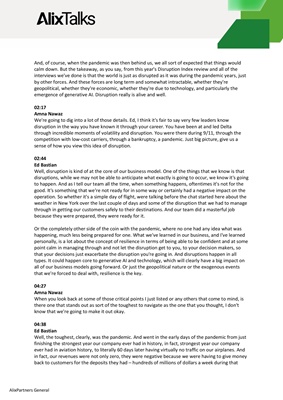
concern in equal measure. Excitement because of the potential to use generative AI to drive a
business's growth or capture more market. But on the other hand, the threat of what it might do to
undermine a business, a whole industry or employment generally. So, I think in equal measure
excitement and concern.
02:16
Amna Nawaz
And are those conversations sort of around excitement leading towards people to hurry towards
incorporating it, or what's the willingness level when it comes to implementing AI in their businesses
right now?
02:28
Simon Freakley
Well, one of the great privileges of my role at AlixPartners is I get to chat with chief executives and Csuite
leaders every day, and I hear firsthand a very common conversation which is "We don't quite
know whether we should be an early adopter, whether we should be a slow follower, how much of
the investment that we make today is going to be relevant in two or three years' time?" So, I think
that every executive is dealing with this question. I think everybody understands inevitably it's going
to transform every company in every industry in every geography. But what does it mean for them?
And I think what we're seeing emerging as a theme is that most people have decided to be slower
followers rather than fast adopters to see, as they watch others move in the market, what seems to
get traction or what might be a cul de sac in a strategy. So, I think everybody's paying very close
attention, knowing they have to have a strategy, but are not moving too quickly in case they become
a hostage of a blind alley.
03:33
Amna Nawaz
Michael, what do you make of where the conversation is right now, especially some of the fear,
some of the concerns around implementing it too early? Is that misplaced, in your view?
03:44
Michael Kratsios
Well, I'm a techno optimist. I work at an artificial intelligence company. I deeply believe in the power
of this technology to transform businesses and to really accelerate whatever companies are trying to
do - whether they are trying to get out to customers better, whether they're trying to increase sales,
whether they're trying to increase efficiencies, there's so many different use cases. But one thing
that we consistently hear, though, with customers is, as we come in excited with our solutions, what
often comes back is this question of "How can we do the appropriate testing and evaluation of these
models to ensure that what we think they're doing is what they're actually doing, and how can we
measure the impact that they're having?" And I think those two questions still remain kind of as an
open science, if you will.
If you listen to any of the leaders of the large language model builders, when they testify on the Hill
or when they speak publicly, they will publicly acknowledge that the testing and evaluation regime
that you need in place for these LLMs is still a very much open question. So for us, what we're
building at Scale and what we're hearing across the industry is "How can you deploy these models,